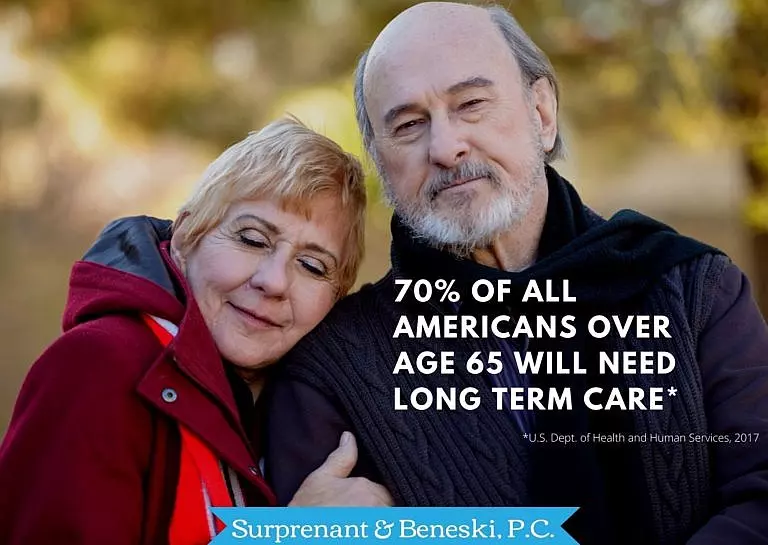Think about it before you need to think about it.
Yes, it might seem crazy to start thinking about a possible future when you’re infirmed and need long-term health care if you’re only in your 50s. You’re young, or relatively young, and healthy. But that’s the point: You don’t want to someday be unable to take care of yourself and wish that you had done some pre-planning. If you’re in your 50s, and you’re not thinking about long-term care, there are plenty of reasons why you should! If you wait to plan for long-term care in your 60s, 70s or beyond, you’re going to find that certain strategies aren’t available (or practical) any longer.
Long-term care is quickly becoming a national crisis for America’s seniors. The number of people age 65 and older in the United States has grown rapidly over most of the 20th century, from 3.1 million in 1900 to 35 million in 2000. In 2018, there were 52 million people age 65 and older, according to the Census Bureau’s Vintage Population Estimates. Older adults are projected to outnumber children under age 18 for the first time in U.S. history by 2034.
There is a need for realistic solutions for the lack of adequate long-term care services, starting with the supply of nursing homes and other care facilities for America’s senior citizens. With improvements in medical care, it’s wonderful that Americans are living longer lives today than ever before! Regrettably, the bad news is that while we’re living longer, we also face the greater likelihood of needing long- term care services. The number of nursing homes in the United States is shrinking at the worst imaginable time. By the year 2030, there will be 15 million Americans with Alzheimer’s disease and our current long-term care system is ill-prepared to manage this need.
These issues all point how important it is for individuals to plan ahead for their own long-term care. So how does one afford paying for long term care? There are generally three approaches people take to afford long-term care:
- Pay for the care yourself. That is, no insurance, no government help – just you. If you are considering this strategy, it is important to research the available services and associated costs. For instance, care in a skilled nursing facility costs approximately $12,000 per month. This really isn’t realistic for many people.
- Let Medicaid (MassHealth) pay for it. Medicaid (not Medicare) was created for persons with typically less than $150,000 to $200,000 in retirement assets. This is where talking with an Elder Law Attorney can be of great benefit. We can guide you through the ins and outs of Medicaid.
- Let insurance pay for your care. After you pay for the insurance, of course – such as long-term insurance or a hybrid life insurance and long-term care policy. Clients who find insurance appealing need a competent broker that can walk them through the myriad of options available. The key to purchasing long-term care insurance is to do so when you’re still healthy to qualify. Once health deteriorates, clients may no longer be eligible for coverage, or their premiums may increase.
Another thing to consider is this: If you do end up needing long-term care, where would you like that to occur? At home, in a family member’s home, in a facility, assisted living? Thinking about this in advance and discussing with your relatives, especially children if you have them, will help your family to make decisions on your behalf when and if the time comes.
So, while you are still fairly young and still healthy enough, now if the time to start if you’re interested in any sort of long-term care insurance. It is unpleasant to think how to pay for the cost of having somebody help you with tasks like getting dressed and going to the bathroom However, if you do plan ahead, you’ll have some peace of mind, earlier. Nobody knows the future, and so your planning may not help you someday – or you may draw up an elaborate plan only to later discover that someday, wow, you’re a 101-year-old marathon runner who needs no help being taken care of, and all that money spent was for naught. But, still, there is something to be said for knowing that you probably have things figured out, way ahead of time.
To begin a conversation about your goals with a qualified Elder Law team, contact Surprenant & Beneski, PC today!
©Surprenant & Beneski, P.C. 35 Arnold Street, New Bedford, MA 02740, 336 South Street, Hyannis MA 02601 and 45 Bristol Drive, Easton MA 02375. This article is for illustration purposes only. This handout does not constitute legal advice. There is no attorney/client relationship created with Surprenant & Beneski, P.C. by this article. DO NOT make decisions based upon information in this handout. Every family is unique and legal advice can only be given after an individual consultation with an elder law attorney. Any decisions made without proper legal advice may cause significant legal and financial problems.
